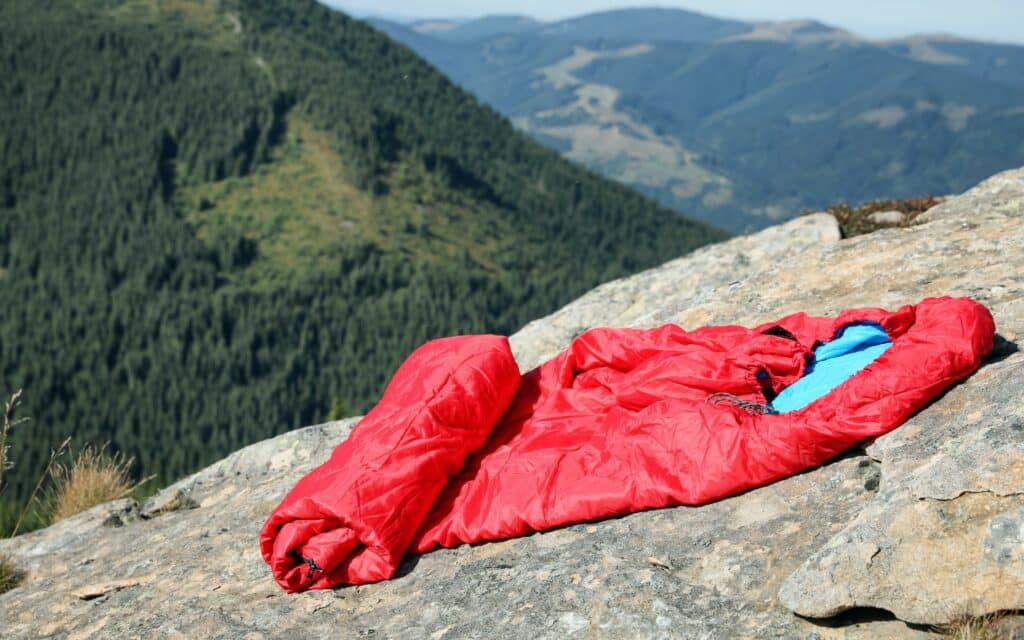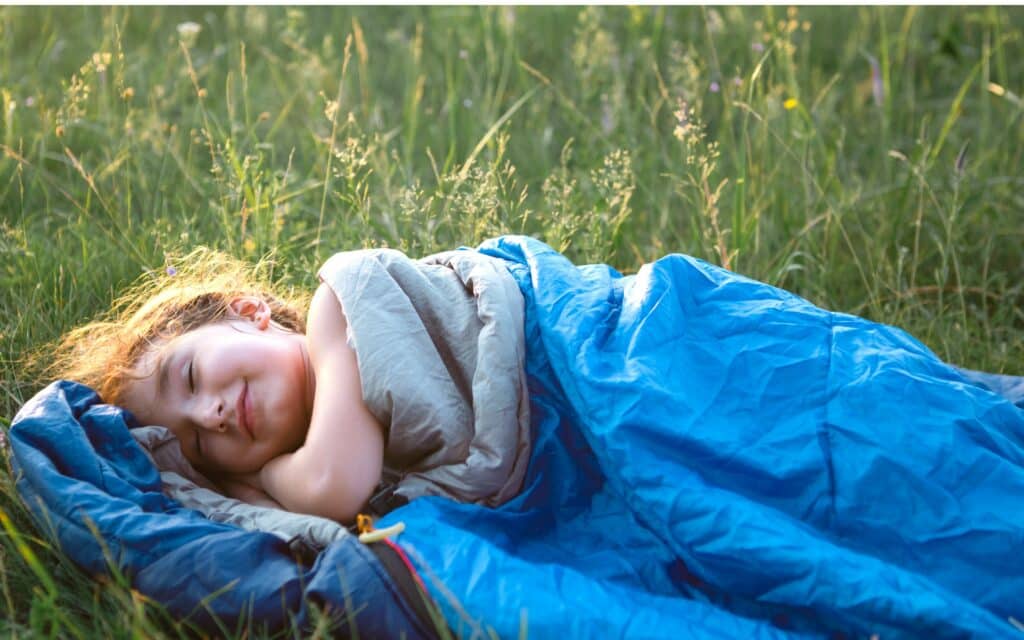For centuries, human beings have prioritized the use of safe, secure structures to protect us during sleep. From taking shelter in caves before houses existed, to our cosy bedrooms today, indoor sleeping has always seemed like the most appealing option. In todays post, however, we ask the question, is sleeping outside good for you?
Sleeping outdoors might be a lot more beneficial than most people realize.
Talk to avid campers and adventurers, and they’ll tell you the nights they spend under the stars are some of the most relaxing they’ll experience. Even evenings in the backseat of a car can be wonderfully freeing when you know how to create a comfortable space.
If you’re struggling to find the quality of sleep you need indoors, or your bedroom just isn’t giving you the comfort you crave, it might be time to explore the benefits of sleeping outside.
Is sleeping outside good for you? An introduction
Human beings have a deep and profound relationship with the earth. While we may not fully understand this connection yet, countless scientists have explored the influence being outdoors can have on our wellbeing and health. We already know exposure to the outdoors can improve our mood, boost creativity, and even increase immunity levels.
Not to mention, getting outside regularly also exposes us to a number of common benefits, like vitamin D from the sun, fresh air, and inspiration from the wonderous things we see.
Sleeping outside is a common way to expand on some of these well-known benefits. Several studies over the years have begun to indicate the occasional night under the stars could be a fantastic balm for our sleepless nights.
Whether you’re dozing in a tent with your family, relaxing in a hammock, or simply soaking up some of the warm weather during summer, sleeping outdoors can be surprisingly beneficial.
On a basic level, it’s an opportunity to reconnect with nature in a way most of us don’t have an opportunity to embrace as much anymore. Our comfy homes and obsessions with technology, combined with the restrictions of the pandemic over the last couple of years, have led us to spending more time indoors than ever before.
While there’s nothing wrong with enjoying the comforts of your own home, the atmosphere we’re exposed to indoors isn’t always as healthy as it could be.
Indoor air quality is often notoriously bad, due to a build-up of dust and chemicals throughout the home. Research even shows lack of poor ventilation in CO2-dense homes can slow the metabolism and increase lethargy.

The benefits of sleeping outside: Why sleep outside?
So, is sleeping outside the solution to the various problems we encounter with the bad indoor atmosphere? The research suggests it may be.
While it’s fair to say outdoor snoozing might not be a good idea in all situations (such as when the weather is poor), it can be a valuable habit.
Getting outdoors for the occasional sleep in nature can help to reconnect you with the organic world, reducing stress, boosting immunity, and even resetting your circadian rhythm. According to research into the trend of sleeping outdoors, occasionally sleeping outside can:
Reset your circadian rhythm
Problems with our natural circadian rhythm are one of the most common reasons why many of us struggle with sleep issues and insomnia. In the past, human beings were naturally built to release certain hormones according to our exposure to sunlight.
The sunlight we absorb in the morning makes us feel energetic, boosting cortisol levels and chasing away melatonin. When the sun goes down, our melatonin production increases, which causes us to feel sleepier, and ready for bed.
Unfortunately, in today’s world, we’re constantly exposed to lights which mimic the effects of the sun, and damage our natural rhythm.
According to one study, electric lighting, and reduced exposure to natural sunlight significantly damages the performance of our internal clock. When volunteers in a study spent a week camping outdoors without smartphones and flashlights, their circadian rhythm reset.
Reduce stress and anxiety
We all experience stress in our lives from time to time. This stress can be a common cause of countless health and wellness problems, including reduced sleep. While there are various ways to manage stress in your day-to-day life, from meditation, to cognitive behavioral therapy, few strategies are more beneficial than spending time in nature.
According to the study of ecotherapy (a scientific field exploring the relationship between nature and stress reduction), being out in the wilderness can lower stress in a host of ways. The great outdoors encourages slower, deeper breathing, which also slows our heart rate and lowers blood pressure.
The sounds, smells, and textures of nature can all help to chase away cortisol levels, helping us to unwind and minimise stress levels, so we’re more able to fall asleep naturally. Something as simple as looking at trees can reduce your stress levels.
Improved cognitive function
Getting a breath of fresh air is good for the body. Indoor air quality is notoriously bad, particularly in homes and buildings with limited circulation. Most homes are brimming with air-tight windows and doors, as well as extensive insulation, to help improve energy efficiency.
Sleeping outdoors can be an excellent way to fill your lungs with high-quality oxygen, and get away from stale air for a little while. Not only does this make you feel better from a health and wellness perspective, but it can also improve your cognitive processing too.
This is because you replace the CO2-saturated air indoors, responsible for causing confusion and fatigue, with oxygen-rich air. A full night outdoors is an excellent way to get your brain working at full capacity again.
Enhanced mood
Aside from fighting back against feelings of stress and anxiety, the benefits of sleeping outside can also extend to boosting your mood on a broader level. Research suggests that spending time outside actually makes us feel happier. In fact, getting outside of your home or office building more often can be just as valuable to your mental health as therapy and medication.
Green spaces and beautiful locations are a great way to distract your mind from the stresses of every day life. At the same time, being outside gives you a chance to basically “escape” a lot of the everyday experiences which might be contributing to your sadness.
A night spent outdoors every once in a while, could be a fantastic way to get your mood back on track, and make a huge difference to your wellbeing.
Increased immunity
Provided you take the right precautions when sleeping outside, you may find that your nature sleeping sessions also improve your health overall too. Research shows the phytoncides released by plants can also be beneficial in protecting human wellness. This is one of the most common reasons why proponents invest in regular periods of “forest bathing”.
Studies show people who simply walk through a forest for a couple of hours each day show lower concentrations of cortisol, as well as lower blood pressure, reducing their risk of heart disease. Being outdoors and inhaling phytoncides increase important white blood cells, for better overall immunity.
Actually sleeping outdoors every once in a while, as long is the weather is good and you stay safe, could be a great way to boost your immunity.

What are the dangers of sleeping outside?
While there are countless benefits to sleeping outdoors, it’s worth noting there are some potential dangers too. For instance, sleeping outside without a tent or another form of protection can be dangerous, if the weather becomes tumultuous. Exposure to cold and rain can cause discomfort, and increase your risk of getting sick.
Even during the summer months, spending too much time outside with no protection can cause you to overheat and dehydrate. This can be very damaging to your health, if you’re not careful. Other potential dangers of sleeping outside could include:
- Exposure to wildlife: Bugs, animals, and other creatures can bite, scratch, and cause infections if you’re not careful. It’s important to ensure you choose a space for your outdoor sleeping adventure you know to be safe from contamination.
- Discomfort: If you’re sleeping outside with virtually no resources, like a mattress or sleeping bag, you could cause muscle pain and other forms of discomfort over time. Make sure you still give your body the support it needs, wherever you sleep.
- Dangerous environments: Unfortunately, we can’t always trust other people around us to treat us with care when we’re sleeping outdoors. There’s a risk someone could steal your supplies, or do something else detrimental to your health when you’re unaware.
The best way to stay safe is to plan your strategy for sleeping outside in advance, and make sure you’re as safe as possible. A good option could be to set up a tent, hammock, or elevated sleeping bag in your own garden, so you know you’re in a safe space.
How can I sleep outdoors all year?
If you’re thinking of exploring the benefits of sleeping outside yourself, the best thing you can do is be adequately prepared. A worthwhile strategy is to start by choosing a day during the summer when you know the weather is likely to be good. However, it’s worth making sure it’s not too hot so you don’t overheat.
You’ll also need to have the right supplies on-hand. An elevated space where you can sleep away from insects and wildlife is important for keeping yourself safe. It’s also helpful to have plenty of water on-hand to keep you hydrated, and comfortable bedding or pillows to support you as you rest.
In winter you need the lots of layers, a hot water bottle at your core region and remember to cover your head, as most heat evaporates from there. You can invest in hand warmers and a high quality sleeping bag.
While sleeping outdoors safely can require some planning and practice, it may be well-worth the effort if you’re looking to improve your health and wellbeing.
Siestio. Sleep matters.
Now read these:
— Crystals for lucid dreaming
— Morning light & great sleep
— Better sleep in warm socks
General advice disclaimer
This article contains general tips and advice. However, no diet or exercise program should be started without consulting your physician or other industry professional first. For more information read our full disclaimer here.







